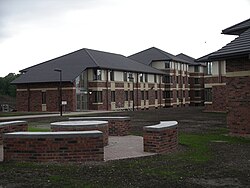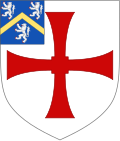| Josephine Butler College | |
|---|---|
| Durham University | |
 College buildings at the Howlands Farm site | |
 Arms of Josephine Butler College Arms: Gules on a chevron Or charged with a Cross formy, with cotises invected, between in chief two lions Argent and in base an open book charged with two covered cups | |
| Coordinates | 54°45′33″N1°34′44″W / 54.7592°N 1.5789°W |
| Motto | French: Comme je trouve |
| Motto in English | As I find |
| Established | 2006 |
| Named for | Josephine Butler |
| Colours | |
| Principal | Gillian Hampden-Thompson |
| Vice principal | Harriet Tebbs |
| Undergraduates | 1300 |
| Postgraduates | 110 |
| Charities | Grace House |
| Major events |
|
| Website | |
| Map | |
Josephine Butler College is a constituent college of Durham University. [1] The college was opened in 2006. [2] It is named after Josephine Elizabeth Butler, a 19th-century feminist and social reformer who had a significant role in improving women's public health and education in England. Butler's father was the cousin of the 2nd Earl Grey, [3] after whom Grey College, Durham is named. [2]
Contents
- History
- Shield and motto
- Facilities
- Howlands Building
- Butler Building
- Accommodation blocks and the Mound
- Student life
- Societies
- Sports
- Notable people
- Principals
- Sports 2
- References
- External links
The college is a fully self-catered college of the university, and, unique in comparison to other Durham colleges, all rooms are en-suite. [1] It is one of the university's first fully self-catered constituent colleges in Durham. [2] The college also has extensive leisure facilities including a library, study spaces, sports hall, outdoor tennis court and music room. [4] It is located within the Howlands Farm site along South Road, next to Stephenson College, Durham. [1]


